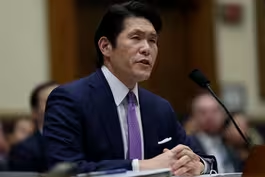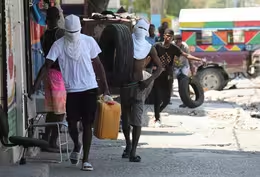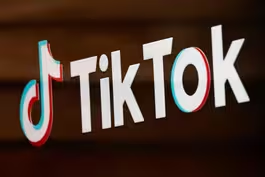
SRL speaks with surgeon general on youth mental health
Clip: 3/12/2024 | 3m 53sVideo has Closed Captions
Student Reporting Labs speaks with the U.S. surgeon general on youth mental health
The new season of PBS NewsHour’s Student Reporting Labs podcast “On Our Minds” is underway. In this episode of the series that focuses on mental health challenges among young people, Bree Campbell and James Kim speak with U.S. Surgeon General Dr. Vivek Murthy.
Problems playing video? | Closed Captioning Feedback
Problems playing video? | Closed Captioning Feedback
Major corporate funding for the PBS News Hour is provided by BDO, BNSF, Consumer Cellular, American Cruise Lines, and Raymond James. Funding for the PBS NewsHour Weekend is provided by...

SRL speaks with surgeon general on youth mental health
Clip: 3/12/2024 | 3m 53sVideo has Closed Captions
The new season of PBS NewsHour’s Student Reporting Labs podcast “On Our Minds” is underway. In this episode of the series that focuses on mental health challenges among young people, Bree Campbell and James Kim speak with U.S. Surgeon General Dr. Vivek Murthy.
Problems playing video? | Closed Captioning Feedback
How to Watch PBS News Hour
PBS News Hour is available to stream on pbs.org and the free PBS App, available on iPhone, Apple TV, Android TV, Android smartphones, Amazon Fire TV, Amazon Fire Tablet, Roku, Samsung Smart TV, and Vizio.
Providing Support for PBS.org
Learn Moreabout PBS online sponsorshipGEOFF BENNETT: Teen mental health is one of the U.S. surgeon general's top priorities.
Our Student Reporting Labs "On Our Minds" podcast from our teenage hosts Bree and James talked recently with the surgeon general, Dr. Vivek Murthy, about his mental health as a teenager, tips for combating loneliness and isolation, and how to create tech-free zones to limit time on social media.
JAMES KIM: Hi, Dr. Murthy.
Thank you so much for speaking with us today.
DR. VIVEK MURTHY, U.S.
Surgeon General: Oh, I'm so glad to be with you, James and Bree, excited for having this conversation.
BREE CAMPBELL: One of your top priorities for our country is youth mental health.
Most of us struggle in some way, but what did you struggle with when you were our age?
And did you ever ask for help?
DR. VIVEK MURTHY: I struggled a lot as a teenager, but I don't think a lot of people knew that.
I put a lot of pressure on myself to sort of excel in certain sort of areas of academia, in terms of schoolwork and stuff like that.
And I think it's probably safe to say that, in some places, my standards were unreasonable.
I was also struggling a lot with loneliness as a kid.
I was really shy and I was very introverted.
I actually really wanted to hang out with other kids, but it took me longer to make friends.
To your question, Bree, I didn't talk to people about it, because I was ashamed.
And also I just -- it wasn't something I heard other people talking about either.
So I kept it all bottled up inside.
And I can tell you from experience that that was not a good strategy.
BREE CAMPBELL: Social media sometimes connects us, but oftentimes doesn't feel deep, and it could also sometimes be harmful.
So how can teenagers best use social media?
DR. VIVEK MURTHY: I don't even met a single person who's figured it all out with social media.
Like -- and I don't think people are having these struggles because somehow your generation is deficient in willpower.
I don't think that's what's going on.
I think you have just as much willpower and strength as prior generations.
But I think what's different is the technology that you're surrounded by.
There are large numbers of adolescents who say that they are being bullied and harassed.
Six in 10 adolescent girls are being approached by strangers on social media in ways that make them feel uncomfortable.
I got bullied at times when I was in middle school, but maybe once every now and -- not at the volume and the severity the kids are experiencing online now.
So that's really concerning.
The third thing that I will mention that concerns me is, what is being displaced by social media?
Like, what's -- what are you not doing because you're spending a lot of time on social media?
That's sort of the question, right?
BREE CAMPBELL: I was always on social media, to the point where I needed a detox.
It was like the algorithms and the likes and just my own time management kind of just like drew me in more and more.
JAMES KIM: I found that a really good solution for me in tackling that was like keeping my phone somewhere I couldn't even see it in the first place.
So I would charge it somewhere else.
DR. VIVEK MURTHY: A few things that are to be mindful of.
Number one is to create tech-free zones, like, in your day, saying, OK, you know what, I'm going to put my phone away a half-hour before I go to sleep.
And I'm actually not going to keep it with me at night.
You can do what James did, which is, I'm going to charge it another room, like, entirely, so I'm not tempted to go at it.
That will positively impact the quality of your sleep.
You could also say, hey, whenever I'm having a meal, whenever I'm catching up with friends, I'm actually -- we're all going to put our phones away, right?
Like, I heard of a common practice that some young people do where, when they all go out to dinner, they will put their phones in the middle and whoever picks it up first to try to look at it or something, they pick up the tab for the group.
It's much more likely that you will be able to sustain that practice than if you try to do it alone.
JAMES KIM: That is awesome advice.
BREE CAMPBELL: Thank you so much for your time.
DR. VIVEK MURTHY: I'm so glad that we talked.
JAMES KIM: Thank you, Dr. Murthy.
GEOFF BENNETT: Season four of "On Our Minds" runs through May, with episodes every two weeks, wherever you listen to your podcasts.
Biden classified docs special counsel testifies to House
Video has Closed Captions
Clip: 3/12/2024 | 3m 48s | Biden classified documents special counsel testifies in House hearing (3m 48s)
Global migrants make their way to Arizona’s southern border
Video has Closed Captions
Clip: 3/12/2024 | 4m 15s | Migrants from all over the world make their way to Arizona’s southern border (4m 15s)
Haiti gang violence bolstered by trafficked U.S. weapons
Video has Closed Captions
Clip: 3/12/2024 | 10m 17s | Widespread gang violence in Haiti continues bolstered by weapons trafficked from the U.S. (10m 17s)
How a seasoned lawyer is forging a new musical path
Video has Closed Captions
Clip: 3/12/2024 | 6m 32s | How a seasoned White House lawyer is forging a new musical path (6m 32s)
A look at data as concerns grow around surging violent crime
Video has Closed Captions
Clip: 3/12/2024 | 6m 24s | As concerns grow around surging violent crime, the numbers tell a different story (6m 24s)
Why TikTok's parent company may face divestment or U.S. ban
Video has Closed Captions
Clip: 3/12/2024 | 11m 6s | Why TikTok's parent company could face divestment or U.S. ban of the platform (11m 6s)
Providing Support for PBS.org
Learn Moreabout PBS online sponsorship
- News and Public Affairs

FRONTLINE is investigative journalism that questions, explains and changes our world.

- News and Public Affairs

Amanpour and Company features conversations with leaders and decision makers.












Support for PBS provided by:
Major corporate funding for the PBS News Hour is provided by BDO, BNSF, Consumer Cellular, American Cruise Lines, and Raymond James. Funding for the PBS NewsHour Weekend is provided by...






